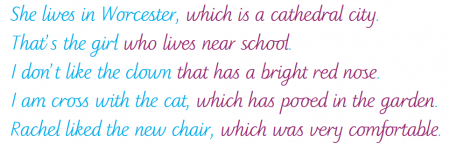RELATIVE CLAUSES
Relative clauses are clauses starting with the relative pronouns who*, that, which, whose, where, when. They are most often used to define or identify the noun that precedes them. Here are some examples:
- Do you know the girl who started in grade 7 last week?
- Can I have the pencil that I gave you this morning?
- A notebook is a computer which can be carried around.
- I won't eat in a restaurant whose cooks smoke.
- I want to live in a place where there is lots to do.
- Yesterday was a day when everything went wrong!
* There is a relative pronoun whom, which can be used as the object of the relative clause. For example: My science teacher is a person whom I like very much. To many people the word whom now sounds old-fashioned, and it is rarely used in spoken English.
Relative pronouns are associated as follows with their preceding noun:
| Preceding noun | Relative pronoun | Examples |
| a person | who(m)/that, whose | - Do you know the girl who .. - He was a man that .. - An orphan is a child whose parents .. |
| a thing | which†/that, whose | - Do you have a computer which .. - The oak a tree that .. - This is a book whose author .. |
Note 1: The relative pronoun whose is used in place of the possessive pronoun. It must be followed by a noun. Example: There's a boy in grade 8 whose father is a professional tennis player. (There's a boy in grade 8. His father is a professional tennis player.)
Note 2: The relative pronouns where and when are used with place and time nouns. Examples: FIS is a school where children from more than 50 countries are educated. 2001 was the year when terrorists attacked the Twin Towers in New York.
Some relative clauses are not used to define or identify the preceding noun but to give extra information about it. Here are some examples:
- My ESL teacher, who came to Germany in 1986, likes to ride his mountain bike.
- The heavy rain, which was unusual for the time of year, destroyed most of the plants in my garden.
- Einstein, who was born in Germany, is famous for his theory of relativity.
- The boy, whose parents both work as teachers at the school, started a fire in the classroom.
- My mother's company, which makes mobile phones, is moving soon from Frankfurt to London.
- In the summer I'm going to visit Italy, where my brother lives.

Note 1: Relative clauses which give extra information, as in the example sentences above, must be separated off by commas.
Note 2: The relative pronoun that cannot be used to introduce an extra-information (non-defining) clause about a person. Wrong: Neil Armstrong, that was born in 1930, was the first man to stand on the moon. Correct: Neil Armstrong, who was born in 1930, was the first man to stand on the moon.
There are two common occasions, particularly in spoken English, when the relative pronoun is omitted:
1. When the pronoun is the object of the relative clause. In the following sentences the pronoun that can be left out is enclosed in (brackets):
- Do you know the girl (who/m) he's talking to?
- Where's the pencil (which) I gave you yesterday?
- I haven't read any of the books (that) I got for Christmas.
- I didn't like that girl (that) you brought to the party.
- Did you find the money (which) you lost?
Note: You cannot omit the relative pronoun a.) if it starts a non-defining relative clause, or, b.) if it is the subject of a defining relative clause. For example, who is necessary in the following sentence: What's the name of the girl who won the tennis tournament?
2. When the relative clause contains a present or past participle and the auxiliary verb to be. In such cases both relative pronoun and auxiliary can be left out:
- Who's that man (who is) standing by the gate?
- The family (that is) living in the next house comes from Slovenia.
- She was wearing a dress (which was) covered in blue flowers.
- Most of the parents (who were) invited to the conference did not come.
- Anyone (that is) caught writing on the walls will be expelled from school.

EJERCICIOS
Complete the sentences using a relative clause.
- Catherine and Sue are two girls (like dancing)
- My mobile phone is something (be very important to me)
- Antony is a friend of mine (live in Boston)
- West Side Story is a musical (be very famous)
- An airport is a place (planes land)
Combine the sentences using relative clauses without relative pronouns (contact clauses).
- We bought a car last week. The car is blue.
The car - The girl is a singer. We met her at the party.
The girl - The bananas are on the table. George bought them.
The bananas - We watched a film last night. It was really scary.
The film - I have to learn new words. They are very difficult.
The new words



No hay comentarios:
Publicar un comentario